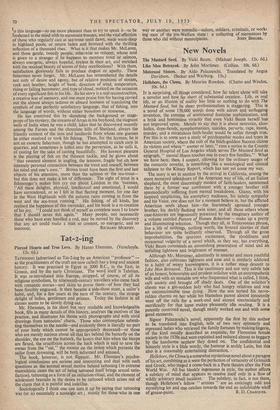Tat-2-ing
TATTOOING (advertised as Tat-2-ing by an American "professor" as the practitioners of the craft are now called) has a long and ancient history. It was practised in Egypt in 2000 B.C., in the East, in Greece, and by the early Christians. The word itself is Tahitian. It was re-introduced into Europe, stripped, of course, of all its religious symbolism, by nineteenth-century travellers who came back with romantic stories—and skins to prove them—of how they had been forcibly engraved. It then became a side-show stunt, a sailor's habit, and, for a few years at the turn of the century, the strange delight of ladies, gentlemen and princes. Today the fashion in all classes seems to be slowly dying out.
Mr. Ebensten, in his short but very readable and knowledgeable book, fills in many details of this history, analyses the motives of the practice, and illustrates his theme with photographs and with vivid drawings from tattooists' charts. Those who contemplate submit- ting themselves to the needle—and evidently there is literally no part of your body which cannot be appropriately decorated—or those who are merely curious about all that lies behind the butterfly on the shoulder, the eye on the buttock, the lovers that kiss when the biceps are flexed, the crucifixion across the back which is said to save the owner from the "cat," the rooster on the instep which prevents the sailor from drowning, will be both informed and amused.
The book, however, is not flippant. Mr. Ebensten's psycho- logical conclusions are serious and interesting and deal with such questions as the normal sexual motive behind tattooing ( in extreme masochistic cases the act of being tattooed itself brings sexual satis- faction), tattooing as a form of an initiation-ritual, and the element of adolescent bravado in the desire to be tattooed which arises out of the claim that it is painful and indelible.
Sociologically I think one can sum it up by saying that tattooing was (or is) essentially a nostalgic art ; mostly for those who in one way or another were nomadic—sailors, soldiers, criminals, or work- ing men of the pre-Welfare state : a collecting of mementoes by
those who did without mantelpieces. JOHN BERGER.


































 Previous page
Previous page